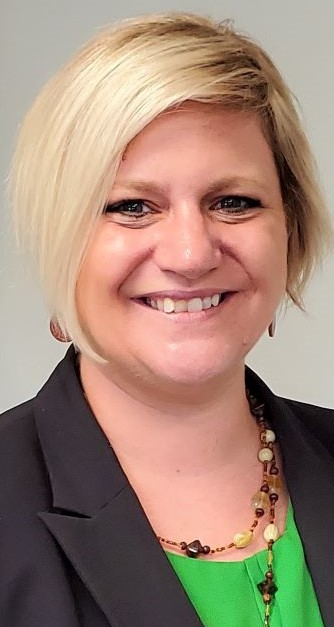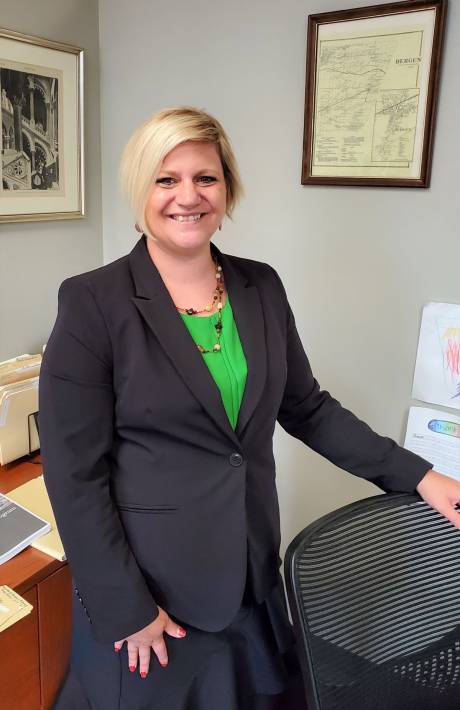Acting City Manager Tabelski: A prepared, in-tune team player working toward a common goal

Part one, which focused on her upbringing, education and influences, was published on Sunday.
---------------
An avid sports fan, Rachael Tabelski undoubtedly was disappointed over the cancellation of the National Collegiate Athletic Association (NCAA) Division I collegiate basketball tournaments this year.
She missed out on rooting for her favorite teams – the North Carolina Tar Heels and Syracuse Orange.
Unfortunately, a different and deadly kind of “March Madness” was unleased upon the world in the form of the COVID-19 pandemic and Tabelski, as Batavia’s assistant city manager, was charged with helping to navigate the community through a substantial downtown in the economy.
Almost four months into this health crisis, Tabelski finds herself as the Acting City Manager following the departure of Martin Moore on June 20. And, using sports as a unifying theme, she’s confident that Batavia and all of Genesee County will get through it and come out even stronger.
“I think sports is a great equalizer – it teaches kids and adults about teamwork, how to operate together to find a common goal and work towards it,” said Tabelski, who revealed that her other favorite teams are the Bills, Sabres and Yankees, and favorite player was NBA great Charles Barkley. “A lot of members of our community are involved in sports … and they know about moving in the same direction. We want more economic activity, we want more residents – more quality residents – and we want our neighborhoods back.”
Tabelski knows a thing or two about trying to attract business to Western New York. She spent eight years at director of marketing & communications at the Genesee County Economic Development Center and a year as director of economic development at the Batavia Development Corporation.
“I got to know the City very well during my days with GCEDC – almost as a liaison to the City, working with Steve Hyde on different Brownfield projects,” she said, adding that she loved her time with the BDC. “It was most difficult to decide whether I wanted to apply for the assistant city manager position because I do enjoy the economic development and the Brownfield development so much.”
She says patience is a virtue when it comes to Brownfield development.
“A lesson I learned from way back at the EDC is when you find a developer for a site, until their capital is ready, they’re not going to move,” she said.
A prime example of that is Ellicott Station (former Soccio & Della Penna property on Ellicott Street), a mixed-use project that has seen little visual change in the four years since it was announced that Savarino Companies of Buffalo had signed on as the developer.
PATHWAY TO PROSPERITY IS KEY
Tabelski said City Council’s decision to join forces with the GCEDC, BDC, Genesee County and the Batavia City School District to form the Batavia Pathway to Prosperity puts the City in an enviable position to develop sites that were once considered to have no future.
The Batavia Pathway to Prosperity ("BP2") partnership is supported by the redirection of 50 percent of new project payment in lieu of taxes (PILOT) to go toward investment in distressed areas of the City.
“When (former City Manager) Jason (Molino) and the Council decided that they were going to get in the game to do planning on City sites, that changed the ability of the economic development center, in my opinion, to engage with the City on specific target areas,” she said. “Now, you can start building stories around planning and trying to redevelop, whatever that may mean. Grant funding, developers, land acquisition – anything of that nature that you could put around something to redevelop it.”
With the door open for the GCEDC to engage with the City, Tabelski said that a couple independent studies served as a road map for government leaders.
She pointed to two key studies: the czb (an urban planning and community development firm) report in 2010 that revealed attitudes and downtown and neighborhood needs and how to acquire those needs; and the Brownfield Opportunity Area study in 2014 that identified large strategic sites such as the City Centre campus, Ellicott Station, Harvester, Healthy Living campus and Creek Park (on Evans Street).
“All of these are underutilized areas in the city, some of which are contaminated -- which brings extra tax credits -- and this is where you need to focus,” she said.
DRI PROJECTS IN VARIOUS STAGES
Tabelski then proceeded to give brief progress report on projects being funded from the $10 million New York State Downtown Revitalization Initiative that was awarded to the City in the fall of 2017.
-- City Centre ($1 million) – She said a feasibility study paid for by Empire State Development and National Grid with a buy-in from the GCEDC and City of Batavia on the match will be completed in four to six weeks and, after that, a construction plan will be proposed and shared with the public.
“We really need to study structural and utility pieces of the mall because we can draw whatever we want as an architect on a piece of paper, but what can the mall actually do or become?” she said. “Can it add a second floor? Can we open up parts of the roof at some point? We’re not going to spend the construction money on the mall until we have a path forward.”
She also said work on the mall roof is about 80 percent complete and will be finished this summer.
-- Jackson Square ($750,000) – Tabelski said the City’s contract with the Department of State has been approved by City Council and is in the design/engineering stage. A work group of business owners in that vicinity has been formed and will be issuing a request for proposal in the near future.
-- Main Street Theater 56 ($700,000) – Another New York Department of State contract, the City’s role is to lease space at the City Centre to the Batavia Players theatrical troupe, which is making monthly payments and is close to finalizing design and preparing for construction, she said.
-- Building Improvement Fund ($600,000) – Tabelski said that these funds go to the BDC, which acts as a conduit to supply the money for private building owners to rehabilitate their structures. She said she expects the Bank Insurance Fund (BIF) and NY Main Street grants to create 10 to 12 new first-floor residential units as well.
-- Ellicott Place (Save-A-Lot) ($1.15 million) – “This will be one of the shining star projects that we have in this DRI,” she said. “It will be an amazing project that will bring more residential downtown and more commercial space availability. That and the theater will hit construction first, in my opinion.”
She also mentioned the Healthy Living (YMCA) campus, a project that received $4.2 million is DRI funds, and the former C.L. Carr building, a $1 million DRI.
Regarding Ellicott Station ($425,000 DRI), Tabelski said she believes residents’ spirits will be lifted as remedial cleanup continues and construction starts – and when Ellicott Trail in that area can be used.
“Each facelift that we do on the exterior of a building or each site that gets cleaned up or each building that is rehabbed or something new is built, it just gives a better sense to our community,” she reasoned. “Even walking from the Southside by Savarino’s project now, it’s not pleasant. But when that changes, maybe your attitude changes.”
CITY IN MIDST OF SOFTWARE UPGRADE
When hired as assistant city manager last August, Tabelski said she went from an “external-facing role” (in the public eye) to an “internal-facing role” – and that the transition has been fairly smooth.
As the assistant, she took on -- and continues to play a large role in -- a massive software upgrade called Tyler New World ERP (Enterprise Resource Planning), a government-specific solution to help create greater efficiencies for local government.
“We were on a quasi-DOS*-based system that (former Assistant City Manager) Gretchen (DiFante) would have talked about years ago,” she said. “That opportunity was appealing and also to try to move the City’s technology in terms of PC (personal computer) usage, and everything that goes along with it.”
Tabelski she felt a sense of satisfaction in being able “to alleviate some pressures on the project management side.”
“To me, it was very rewarding to do that and also to be here to sit through all the budget meetings last year, and understand where the revenue sources are and where are biggest expenses are,” she said. “We have to protect our community with police and fire and those aren’t revenue-generating services. Where we have a water fund and a sewer fund, they can generate fees for the services you get … the commodity and the utility.”
Revenue for the 2020-21 fiscal year is projected to decrease by 15 to 20 percent, Tabelski said, assuming a 30-percent reduction in sales tax. As a result, the management team instituted an austerity plan – cutting expenses, deferring projects and travel, and implementing a hiring freeze.
‘CUSTOMERS ARE OUR RESIDENTS’
Tabelski compared managing a city to running a business.
“Our customers are our residents … our board of directors is the Council,” she said. “They tell us how they want things, what products we’re going to provide for our residents and what our residents are asking for, and we tell them financially if we can do it or how to get there.”
Sometimes, a way to “get there” is to raise property taxes, which is what City Council approved for 2020-21 (a 7.5-percent increase).
As far as 2021-22 is concerned, Tabelski said, “I can’t even go there yet. We’ll start plugging in budget numbers in late October.”
The first two weeks of Tabelski’s new job have been filled with meetings – with department heads (police, fire and public works), staff and stakeholders.
She says the City is moving forward and she attributes that, in part, to her preparation and attention to detail.
“I pride myself in being very prepared and creating an agenda in advance. I don’t want meetings to last longer than they have to. I don’t want to waste anyone’s time,” she said.
Tabelski also works with City Council President Eugene Jankowski to set the governing body’s meeting agendas.
Jankowski concurred that Tabelski is “very well prepared and researched before we get into a topic.”
A POSITIVE TRACK RECORD
“I’ve dealt with Rachael for several years now through her other roles in community – and I found her to be very in tune to what’s going on,” he said. “She makes good suggestions and ideas, and is not afraid to make a decision and move forward with it or make adjustments, if necessary.”
He said that Council has not finalized the process for finding a permanent manager yet. When asked about additional pay for Tabelski’s additional duties, he said the subject “hasn’t come up yet.”
Tabelski said she understands the future is in Council’s hands, but made it clear that she does want to continue to serve the residents of Batavia.
“It (Moore’s leaving) happened very suddenly, so I am sure they will get back to that and we’ll have some conversations about that,” she said.
“I feel confident that myself and the department heads are moving projects and priorities and things along, especially during COVID-19 where the rules are changing on a daily basis. Trying to effectively communicate to the public, to the Council and to the employees (in the midst of the pandemic) has been a massive undertaking.”
*(DOS: Disk Operating System)

